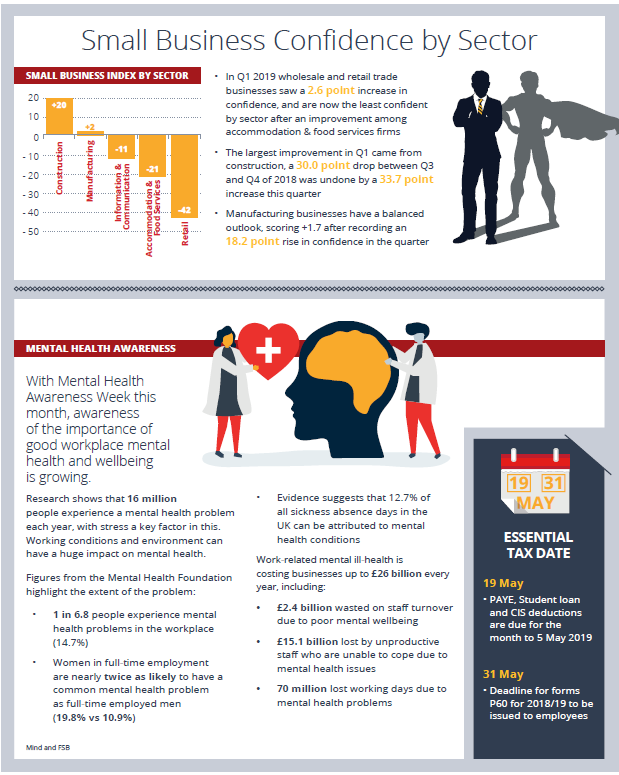Business Review May 2019
£200 MILLION PLEDGE TO BRITISH BUSINESS
High-growth UK businesses are set to benefit from access to an additional £200 million of government support as the UK leaves the EU.
The package is part of government efforts to ensure the UK is ‘the best place in the world to start and grow a business’. According to the government, the funds will be made available to innovative British businesses and will ensure such firms continue to have access to the finance needed to grow and thrive when the current relationship with the European Investment Fund changes post-Brexit.
This new funding will be available through the government-owned British Business Bank which was established in order to make finance markets work better for small businesses in the UK, at all stages of their development. The bank currently supports over £5.9 billion of funding to 82,000 small businesses and will provide the extra funds through its venture capital and growth finance funding partners, as the UK leaves the EU.
The additional funds are specifically aimed at businesses either startingout or scaling-up. This type of funding has traditionally been sought by fast-growing firms in the science and technology sectors.
INTEREST RATES ON HOLD FOR NOW
Although the Bank of England has again left interest rates on hold, it did upgrade its growth forecasts and warned that rates may need to rise more sharply in the coming years than financial markets currently expect.
Following its meeting on 2 May, the Bank’s Monetary Policy Committee voted unanimously to leave rates unchanged. This was the ninth month in a row that rates have remained on hold since they were increased from 0.5% to 0.75% in August last year.
The Bank also reiterated its short-term reluctance to sanction any change in rates until further clarity over Brexit emerges. And it also once again stated that its monetary policy response to Brexit could be in either direction.
There was, however, a warning that rate rises during the next three years could be ‘more frequent’ than the single increase financial markets were predicting. The Bank upgraded its UK economic growth forecast for 2019 from 1.2% to 1.5% and said that any rise in growth above that level in 2020 and 2021 could prompt further rate rises.
At a news conference, Bank Governor Mark Carney said: “If something broadly like this forecast comes to pass… it will require interest rate increases over that period and it will require more frequent interest rate increases than the market currently expects.”
AUTO-ENROLMENT SUCCESS FOR SMALL BUSINESS WORKERS
The government has hailed auto-enrolment an ‘extraordinary success’ as new research shows employees of small employers have benefited most from the pension reforms.
Automatic enrolment was introduced by the government in 2012 to encourage more employees to save privately for their retirement, with the policy requiring all UK employers to automatically enrol eligible employees into a pension scheme. New research by the Institute for Fiscal Studies (IFS) has revealed the huge difference auto-enrolment has made to workplace pension participation among employees of small firms.
The IFS estimate that only 26% of small business employees would be saving in a workplace pension if auto-enrolment had not been introduced, whereas the actual figure is now 70%. In other words, auto-enrolment has effectively increased the pension participation rate amongst employees of small firms by 44 percentage points.
Commenting on the findings, Pensions Minister Guy Opperman said: “Automatic enrolment has been an extraordinary success, transforming pension saving and improving the retirement prospects of more than 10 million workers already. As this report shows, small business owners all over the UK have made this possible. This radical reform is creating a new relationship between the employee and their employer.”
APPRENTICESHIPS NEED FURTHER REFORM
The Federation of Small Businesses (FSB) is urging the government to use both the upcoming Review of the Apprenticeship Levy and the Spending Review 2019 to introduce further reforms to make the apprenticeship system fit for the future.
Government data shows that, since the introduction of the 2017 reforms, apprenticeship numbers have remained lower than pre-reform levels, particularly Level 2 and Level 3 new starts. This downward trend is confirmed by FSB research, which found small firms in England are still struggling to take on new apprentices. Furthermore, the research found over a quarter of small businesses that employed apprentices before and after the reforms said they felt the reforms have had a negative impact on their business.
FSB National Chairman Mike Cherry commented: “Worryingly, our research shows that many small firms are turning away from apprenticeships with some of the 2017 reforms being the cause. Changes, like the explicit requirement for a minimum of 20 per cent off-the-job training, are causing real headaches. The more recent halving of the co-investment requirement to 5% is a major step forward to reduce the cost of apprenticeships. Small businesses need more support like this if they are to continue to be the champions of apprenticeships.”
BUSINESS RESPONDS TO BREXIT DEVELOPMENTS
Both the British Chambers of Commerce (BCC) and the Confederation of British Industry (CBI) have urged politicians to sort out the Brexit turmoil following EU approval of a six-month extension.
After late-night talks in Brussels on 10 April, EU leaders granted the UK a sixmonth ‘flexible’ Brexit extension, setting a new deadline of 23:00 GMT on 31 October. While this did avert the prospectof the UK leaving the EU without a deal in mid-April, business groups responded to the news by urging politicians to use the additional time wisely.
BCC Director-General Adam Marshall said: “This extension buys Parliament some time to come to a consensus, but they can’t afford to squander it. Politicians must urgently agree on a way forward. It would be a disaster or business confidence and investment if a similar late-night drama is played out yet again in October.”
And CBI Director-General Carolyn Fairbairn echoed those comments: “This new extension means that an imminent economic crisis has been averted, but it needs to mark a fresh start. For the good of jobs and communities across the country, all political leaders must use the time well. Sincere cross-party collaboration must happen now to end this crisis.”
OTHER NEWS
Few SMEs considering overseas expansion
Less than a quarter (22%) of the UK’s SMEs plan to expand their businesses overseas, according to new research conducted by DocuSign. A lack of available finance, inexperience and large amounts of red tape were all cited as significant barriers to overseas expansion. In addition, the research highlighted a dramatic fall in confidence amongst SME business owners as a result of trade uncertainty.
Withdrawal charges bad for business
New research from consumer group Which? has found that withdrawal charges were introduced at 1,700 cash machines during the first quarter of this year. This signals bad news for business according to the FSB, as charging consumers to withdraw their own cash reduces the amount of money they have available to spend with small businesses and dampens consumer appetite.
UK long-hours culture not working
Research by the TUC suggests UK employees are working the longest hours in Europe. In 2018, a full-time employee in Britain worked 42 hours a week on average, almost two hours more than their average EU counterpart and over four hours more than in Denmark, the EU country with the shortest working hours. The UK’s long-hours culture is not translating into higher productivity, however, with workers in similar economies found to be much more productive for each hour worked.

Information within this document is based on our current understanding and can be subject to change without notice and the accuracy and completeness of the information cannot be guaranteed. It does not provide individual tailored advice and is for information purposes only. Some rules may vary in different parts of the UK. We cannot assume legal liability for any errors or omissions it might contain. Levels and bases of, and reliefs from, taxation are those currently applying or proposed and are subject to change; their value depends on individual circumstances. No part of this document may be reproduced in any manner without prior permission.
